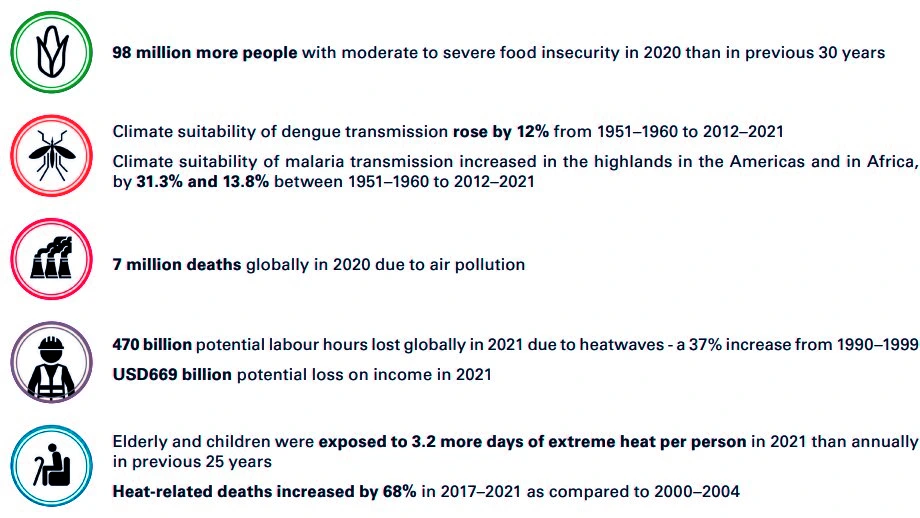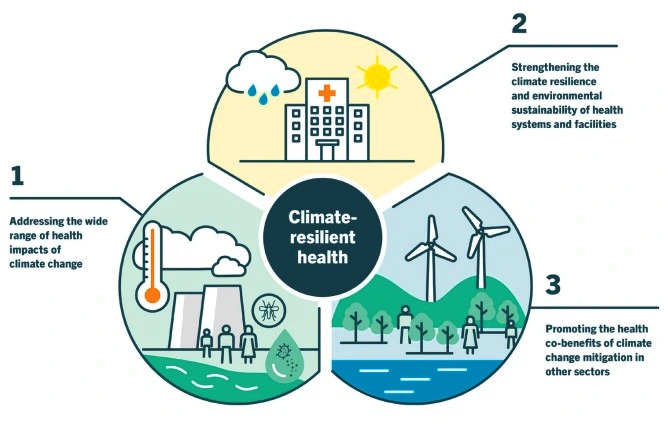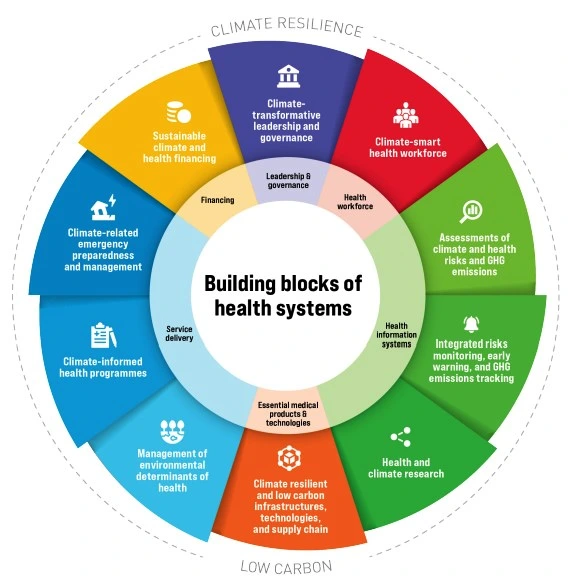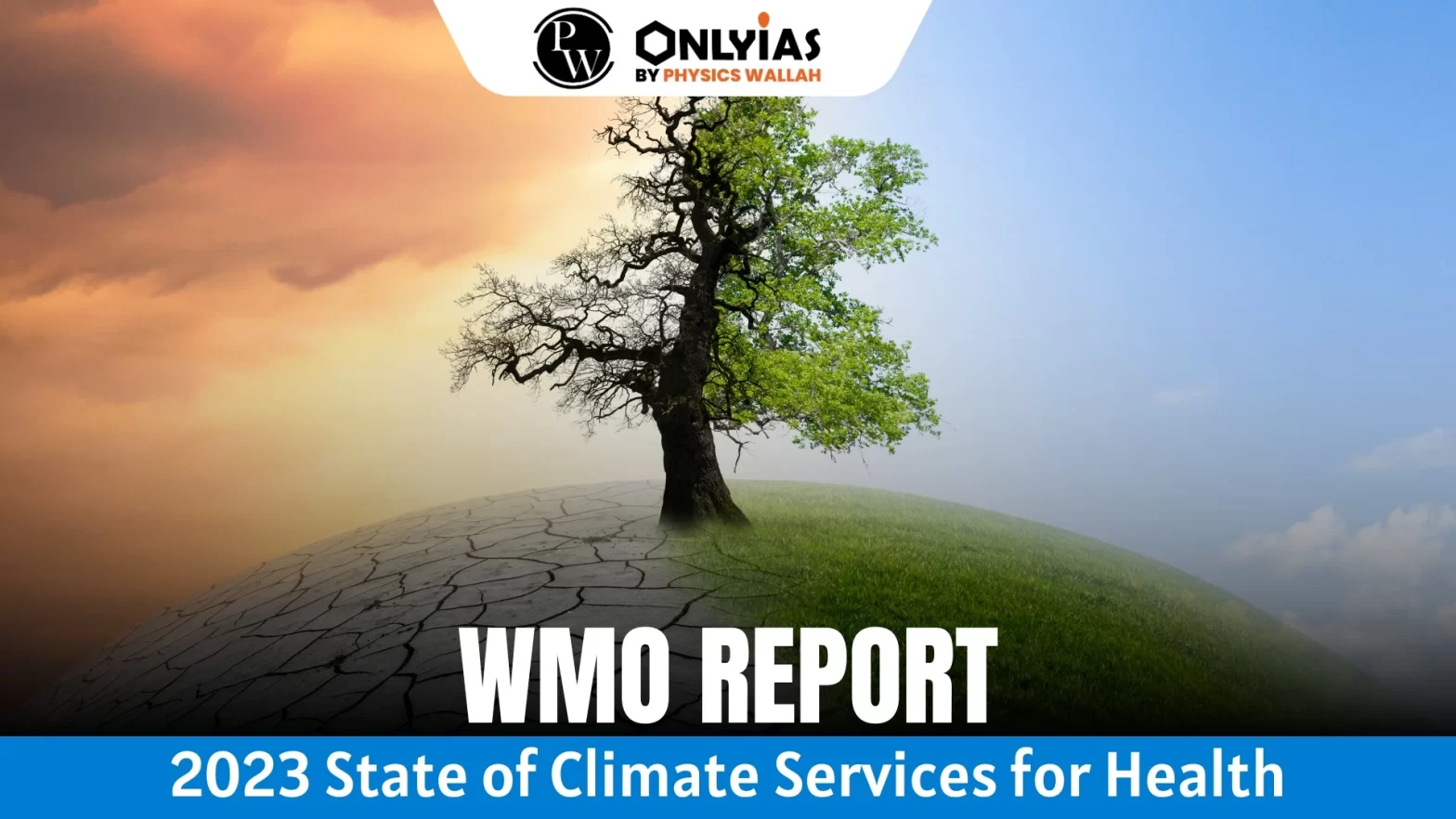Context: The World Meteorological Organization (WMO) recently released the State of Climate Services for health report.
| Relevancy for Prelims: State of Climate Services for Health Report, WMO, Green Climate Fund (GCF), Global Framework for Climate Services (GFCS), UNDP, United Nations Framework Convention on Climate Change (UNFCCC), and National Framework For Climate Services (NFCS).
Relevancy for Mains: Key findings of the State of Climate Services for Health Report, impacts of climate change on health, Global Climate Policies, Benefits of Climate Services for Health, Challenges and solutions to implementing them. |
2023 State of Climate Services for Health Report: Key Findings
- The State of Climate Services for health report has been published annually since 2019.
- Produced under the auspices of the WMO-led Global Framework for Climate Services, the 2023 report includes contributions from the Adaptation Fund, the Green Climate Fund (GCF), the UN Development Programme (UNDP), the World Health Organization (WHO).
Global Framework for Climate Services (GFCS):
- GFCS is a partnership of governments and organizations at a global level, for the production and better usage of climate information and services.
- Aim: To facilitate researchers and users of climate information and services to join hands to make informed and actionable decisions for long-term betterment.
- Major Components of GFCS:
- Observations and Monitoring
- Research, Modelling and Prediction
- Climate Services Information System
- User Interface Platform
- Capacity Building
|
Know more about State Of Climate Services Report 2023 – WMO here.
What are the impacts of climate change on health?
- Direct Impact: As per the IPCC’s Sixth Assessment Report, climate change is a multiplier of health vulnerabilities resulting in direct injuries and death.
- Small island developing States (SIDS) and least developed countries (LDCs): 1.4 million people (70% of the total deaths) in LDCs lost their lives due to weather-, climate and water-related hazards in the past fifty years.
- Since 1970, SIDS have lost 153 billion US dollars (USD) due to weather-, climate and water-related hazards.
- Impact of Extreme heat: Aged people who are more susceptible to the negative effects of intense heat saw 3.1 billion more person-days of heatwaves globally in 2012–2021.

- Indirect Impact: Climate change leads to indirect effects such as deterioration of mental health and exacerbation of non-communicable diseases resulting from increasingly frequent and intense temperature extremes, cyclones, storms, floods, droughts and wildfires.
- Food insecurity: Climate change is exacerbating risks of food insecurity, as environmental impacts on food systems affect food availability, access and utilization, and ultimately health and nutrition.
- Compared to 1951–1960, 29% more territory on Earth experienced an intense drought for at least one month annually between 2012 and 2021, endangering sanitation, water security, and food security.
Global Climate Policies: Integrating Health for a Sustainable Future
- Growing Emphasis on Health: It is evident in climate-related policies. Ex- the United Nations Framework Convention on Climate Change (UNFCCC) reports, National Adaptation Plans (NAPs), Health National Adaptation Plans (HNAPs),etc.
- The national climate plans, or NDCs, now acknowledge that climate change poses a risk to both human welfare and the health of the planet. An analysis of 193 NDC reports revealed that the majority of NDCs and all National Adaptation Plans (NAPs) made reference to health.
- Currently, around one third (29%) of NDCs dedicate climate funds to plans and/or actions related to health.
- Health Programme in UNFCCC: In 2021, it was advocated for the first time in the UNFCCC process, even though Article 4 of the UNFCCC recognises health.
- ATACH by WHO: Alliance for Transformative Action on Climate and Health (ATACH) has been established by the World Health Organisation (WHO).
- Its health ministers have committed to reduce greenhouse gas emissions from their health systems and/or strengthen their systems’ resilience to climate change.
- Operational Framework for Climate Resilient and Low Carbon Health Systems: It has been established by the WHO to help direct the health sector and effectively address the problems posed by climate variability and change.

What are the concerns associated with the NDCs (Nationally Determined Contributions) of countries?
- Inadequate preparedness: According to the report, the health sector is not adequately prepared to safeguard people from the effects of heat and other extreme weather events.
- No financial targets: Merely 11% establish unrestricted financial goals for all or some of their health-related plans, initiatives, and/or strategies.
- Underutilisation of climate information for health: Globally, 28% of NDCs prioritize vector-borne diseases, and 25% prioritize injury and mortality from extreme weather events.
- In spite of this, less than 25% of health ministries worldwide use climate information and services to track health risks associated with climate sensitivity.
- Data Services Gap: Although data services for the health sector are provided by around 74% of the National Meteorological and Hydrological Services (NMHS), they are not especially designed with the needs of the sector.
- Data Exchange: In order to promote data exchange and cooperation, the Ministry of Health and NMHSs do not have a formal agreement in place in at least 85% of the countries.
Also Read: NDC Synthesis Report For 2023: UNFCCC
What are Climate Services for Health?
- About: It is a type of health service to help the health sector become smarter and more agile in an uncertain and increasingly extreme climate.
- Through this, climate information can be customized through climate services to suitably advise sectoral decision makers.
- For Example: In Europe, a mobile app has been developed to provide information on risks of heatwaves in urban environments. In 2022, 1 000 Athenians and visitors used the app to cope with heat and air pollution.
- Aim: To generate comprehensive, actionable climate data from a well-founded, holistic viewpoint of the past, present, and future conditions of societal threats associated with climate change.
What are the benefits of Climate Services for Health?
- Informed Decision Making: They provide decision-makers the ability to think ahead and plan in order to guide practices and policies that prove protective against climate related disasters.
- Empowering Health Professionals: Climate services can help health professionals better understand the risks associated with climate change, identify the most vulnerable groups, and assist in the efficient planning and implementation of interventions.
- Disaster Management: They are essential for risk assessment, emergency preparedness, early warning, and programmatic measures to safeguard public health.
- They are essential to disaster risk reduction by improving early warning systems, disease prevention and control initiatives, heatwave and air quality management, etc.
- Empowerment of citizenry: Climate services contribute to empowering individuals, and building climate-resilient health systems and healthy communities.
| Case Study:
Social Safety Net System Project (SSNSP) of Mauritania:
- Aim: The project developed a predictive model to anticipate drought risk and food security needs during upcoming lean seasons with the help of remote sensing.
- Outcome: The programme allowed households affected by hazards to become solvent, and thus prevented recourse to harmful adaptation measures (such as the sale of livestock at low prices, marriage of young girls and so forth).
|
Challenges To Implementing Climate Services For Health
- Lack of clarity about the term: The terms “Climate-informed decision tools” and “climate services” are used interchangeably by the health community.
- Climate services are actually the partnerships and techniques used to enhance existing health sector decision tools and processes.
- For example, epidemiological studies, monitoring and surveillance, early warning and detection, with information about the climate exposure at different timescales.
- No Perceived Distinction Between Climate and Weather: The healthcare sector views climate and weather data as the same.
- The strong distinction between climate and weather is not perceived by the health community and the division made by the meteorological community is seen as a barrier to data and understanding.
- Lack of Formalization through Collaboration: Collaboration is not generally formalized through Memorandums of Understanding, working groups etc .
- Collaboration is essential for building capacity, fostering relationships, fostering a common understanding, and creating a more supportive partnership and enabling environment.
Way Forward:
- Fostering Data Sharing and Collaboration: allowing policy directives to encourage data sharing and collaboration between weather and health entities.
- Implementing coordinating structures and interconnected, multisectoral policies at all institutional and operational levels.
- Awareness Creation: Raising awareness of the importance of climate information for climate adaptation and resilience, and of the technical requirements and investment gaps.
- Creation of new professional cadres: Creating new professional cadres with training in transdisciplinary climate and health and institutional support to work in a variety of partnership contexts.
- Enhancing Climate Literacy: Enhancing the public’s understanding of climate literacy and the transdisciplinary communication abilities of stakeholders involved in meteorology, climate, the environment, and health.
- Enhancing Local participation: Building national capabilities to enhance local expertise (such as gathering epidemiological, climatic, and socioeconomic data), as well as institutional communication with legislators.

- Identifying and addressing knowledge gaps: Establishing a systematic process to identify and respond to research gaps and knowledge priorities between and across health, climate and other sciences.
Conclusion:
Addressing the impacts of climate change on health requires collaborative efforts, enhanced climate services, and improved integration of climate information into health policies, emphasizing the need for proactive measures and informed decision-making to build climate-resilient and healthier communities globally.
![]() 8 Dec 2023
8 Dec 2023



